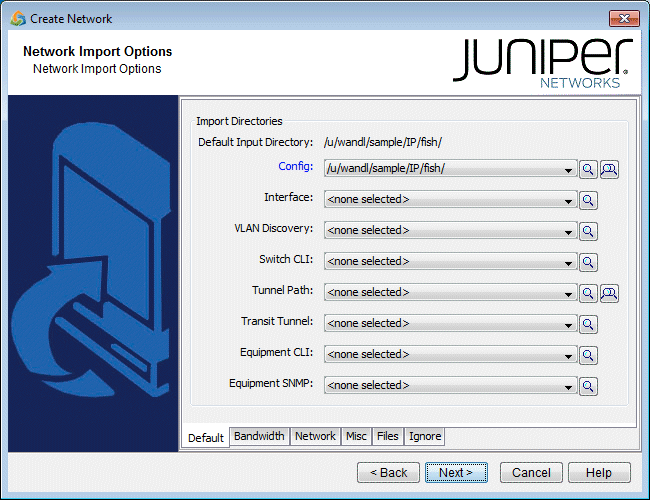Default Inputs
The next page contains tabs that allow the user to specify different options that will be applied when importing configuration files.

- On the Default tab are shown the most common import directory options. The subdirectories will be automatically populated if they have the following names: config, interface, bridge, tunnel_path, transit_tunnel, equipment_cli. Otherwise, click on the magnifying glass to browse for the directory. To select more than one directory, select the button with two magnifying glasses. In the advanced browser, a subfolder can be expanded or collapsed by clicking on the “+” or “-” hinges to the left of each entry. Select the desired subdirectories to be involved in the config import by clicking on the box or circle to the left of each.
- The following information can be collected via NorthStar
Planner’s online module, or a third party collection software.
Option
Description
Corresponding Text Interface Option
Config Directory
This directory contains your router configuration file obtained using commands like the following:
Juniper:
show configuration | display inheritance
Cisco:
show running-config
Interface Directory
This directory contains interface bandwidth data retrieved using CLI commands. Read the CLI results of “show interface” on the router to get the bandwidth of the interfaces and save it to a file. The CLI commands are:
Juniper:
# show configuration | match “host-name” # show interfaces | no-more
To extract the hostname, use the following command:
# show configuration system host-name
Cisco:
# show running | include <hostname> # show interfaces
-i interfaceDir
VLAN Discovery directory
This directory contains the intermediate results after parsing SNMP output of layer 2 switches collected by NorthStar Planner, usually in the “intermediates” directory. Alternatively, the raw SNMP results collected by NorthStar Planner in the “bridge” directory can be specified here, and the parsing will be done to create the intermediates directory before importing it using this config extraction wizard.
-vlandiscovery vlandir
Switch CLI directory
This directory contains CLI output of layer 2 switches, which can be used to stitch up the physical and Layer 2 topology. e.g., “show cdp neighbor detail” for Cisco.
Each file should be preceded with a line indicating the hostname. For example, “host-name” for Juniper and <hostname>” for Cisco.
-EXSW EXSWdir
Tunnel path
MPLS Tunnel Extraction retrieves the actual placement of the tunnel and the status (up or down) of the LSP paths by parsing the output of the Juniper JUNOS command:
Juniper:
show mpls lsp statistics ingress extensive
Cisco:
show mpls traffic-eng tunnels
Each file should be preceded with a line indicating the hostname. For example, “host-name” for Juniper and <hostname>” for Cisco.
Transit Tunnel
This option is similar to Tunnel path, except that in addition to ingress tunnels, it also includes FRR tunnels. This directory includes the output of the Juniper JUNOS command:
Juniper:
show rsvp session ingress detail show rsvp session transit detail
Cisco:
show mpls traffic-eng tunnels backup
Each file should be preceded with a line indicating the hostname. For example, “host-name” for Juniper and <hostname>” for Cisco.
Equipment CLI
This directory contains the output of CLI commands related to equipment inventory, one file per router. See /u/wandl/db/command/<vendor>.cli to see the list of commands.
Equipment SNMP
This directory contains the output of SNMP commands related to equipment inventory which can be collected by the online module via Inventory > Hardware Inventory, Load > Collect Inventory into /u/wandl/data/collection/.LiveNetwork/equipment.
